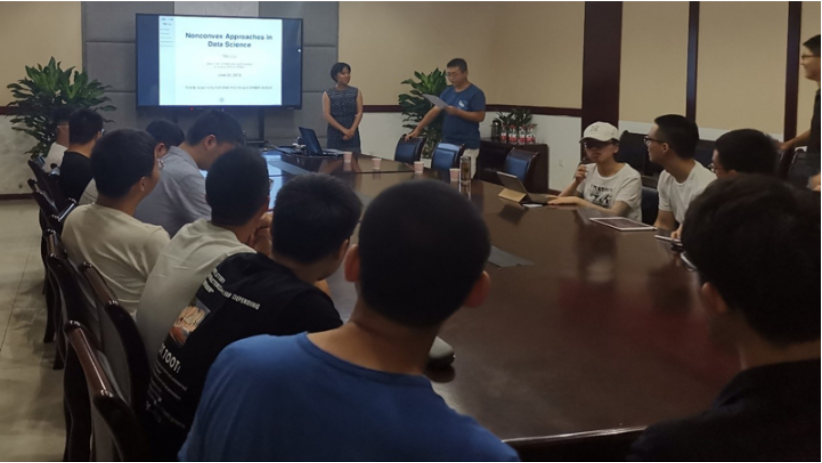On the afternoon of June 28, 2019, Professor Lou Yifei from the Department of Mathematical Sciences of the University of Texas at Dallas arrived at the School of Big Data and Software Engineering of Chongqing University and had discussion and communication with Mr. Chen Feiyu, Ms. Fan Qilin and Associate Professor Huang Sheng of the School with regard to cooperation on cultivation of postgraduates and scientific research. Professor Lou delivered an academic report titled “Nonconvex Approaches in Data Science” at the Conference Room of the School. Chen Feiyu presided at the event. Teachers and postgraduates in related areas of the School attended the event.

Professor Lou Yifei is currently an assistant professor of the Department of Mathematical Sciences of the University of Texas at Dallas. In 2005, Professor Lou got her bachelor’s degree in science from Peking University. In 2007, she obtained her master’s degree in mathematics from the University of California at Los Angeles (UCLA). In 2010, she obtained her doctor’s degree in mathematics from UCLA. From 2011 to 2014, Professor Lou was engaged in post-doctoral research respectively at Georgia Institute of Technology, UCLA and UC Irvine. Her main research areas include compressive sensing and its application, picture analysis and optimization algorithm. Professor Lou has published more than 30 papers in first-rate journals such as SAIM J. Imaging Sci., SAIM J. Sci. Comput., and IEEE.Trans. Big Data in recent years, and has directed a number of projects supported by the National Science Foundation of the USA. As recognition of her considerable contribution in “Mathematical Modeling for Data to Insight and Beyond”, the National Science Foundation of the USA awarded her with CAREER Award in 2019 (400,000 USD).
In her academic report, Professor Lou Yifei introduced the scientific problems with small sample reconstruction with application of MRI (zeugmatography) as the starting point. She explained the obscure mathematical model vividly with straightforward languages, and clearly described the development sequence of data sparseness. Lou also analyzed the nature reflected by L1-L2 and L1/L2 norm constraint in simple terms and elaborated several algorithms for solving non-convex problems and analyzed the characteristics and defects of the algorithm. With super-resolution as the example, Lou explained the application of model in practice. In the last part of her report, Lou summarized the mature application of image reconstruction in the industrial circle and proposed the future research direction.

In the question and answer part, students got actively involved. They raised a lot of interested questions and had in-depth discussion with Professor Lou Yifei, including effective selection of various parameters, suggestions on improvement of algorithm complexity and effective combination of two mathematical models. Professor Lou answered the questions with great patience and enthusiasm.

In the last session, Huang Sheng summarized the academic report in terms of current research hotspots and related issues and encouraged attendants to study intensively, and broaden their research horizon and devote themselves to research, so as to strengthen their ability. After the heated discussion and active interaction between teachers and students, this academic lecture was brought to a successful end.
